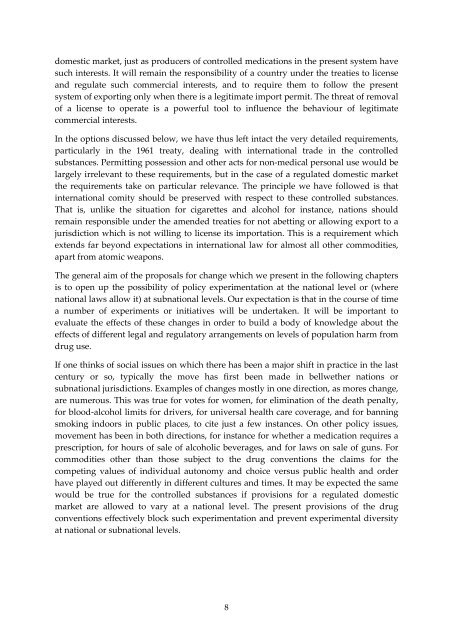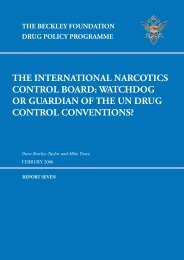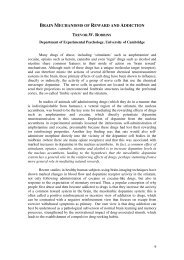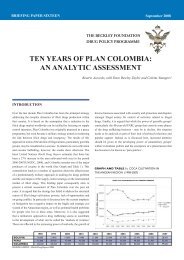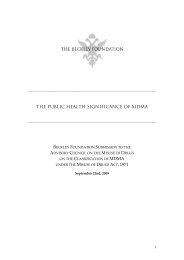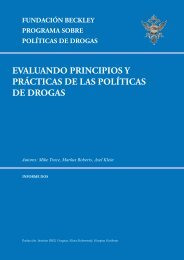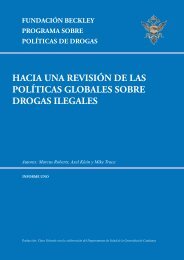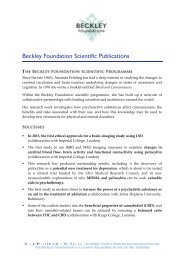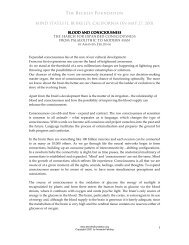roadmaps to reforming the un drug conventions - Beckley Foundation
roadmaps to reforming the un drug conventions - Beckley Foundation
roadmaps to reforming the un drug conventions - Beckley Foundation
You also want an ePaper? Increase the reach of your titles
YUMPU automatically turns print PDFs into web optimized ePapers that Google loves.
domestic market, just as producers of controlled medications in <strong>the</strong> present system havesuch interests. It will remain <strong>the</strong> responsibility of a co<strong>un</strong>try <strong>un</strong>der <strong>the</strong> treaties <strong>to</strong> licenseand regulate such commercial interests, and <strong>to</strong> require <strong>the</strong>m <strong>to</strong> follow <strong>the</strong> presentsystem of exporting only when <strong>the</strong>re is a legitimate import permit. The threat of removalof a license <strong>to</strong> operate is a powerful <strong>to</strong>ol <strong>to</strong> influence <strong>the</strong> behaviour of legitimatecommercial interests.In <strong>the</strong> options discussed below, we have thus left intact <strong>the</strong> very detailed requirements,particularly in <strong>the</strong> 1961 treaty, dealing with international trade in <strong>the</strong> controlledsubstances. Permitting possession and o<strong>the</strong>r acts for non-medical personal use would belargely irrelevant <strong>to</strong> <strong>the</strong>se requirements, but in <strong>the</strong> case of a regulated domestic market<strong>the</strong> requirements take on particular relevance. The principle we have followed is thatinternational comity should be preserved with respect <strong>to</strong> <strong>the</strong>se controlled substances.That is, <strong>un</strong>like <strong>the</strong> situation for cigarettes and alcohol for instance, nations shouldremain responsible <strong>un</strong>der <strong>the</strong> amended treaties for not abetting or allowing export <strong>to</strong> ajurisdiction which is not willing <strong>to</strong> license its importation. This is a requirement whichextends far beyond expectations in international law for almost all o<strong>the</strong>r commodities,apart from a<strong>to</strong>mic weapons.The general aim of <strong>the</strong> proposals for change which we present in <strong>the</strong> following chaptersis <strong>to</strong> open up <strong>the</strong> possibility of policy experimentation at <strong>the</strong> national level or (wherenational laws allow it) at subnational levels. Our expectation is that in <strong>the</strong> course of timea number of experiments or initiatives will be <strong>un</strong>dertaken. It will be important <strong>to</strong>evaluate <strong>the</strong> effects of <strong>the</strong>se changes in order <strong>to</strong> build a body of knowledge about <strong>the</strong>effects of different legal and regula<strong>to</strong>ry arrangements on levels of population harm from<strong>drug</strong> use.If one thinks of social issues on which <strong>the</strong>re has been a major shift in practice in <strong>the</strong> lastcentury or so, typically <strong>the</strong> move has first been made in bellwe<strong>the</strong>r nations orsubnational jurisdictions. Examples of changes mostly in one direction, as mores change,are numerous. This was true for votes for women, for elimination of <strong>the</strong> death penalty,for blood-alcohol limits for drivers, for <strong>un</strong>iversal health care coverage, and for banningsmoking indoors in public places, <strong>to</strong> cite just a few instances. On o<strong>the</strong>r policy issues,movement has been in both directions, for instance for whe<strong>the</strong>r a medication requires aprescription, for hours of sale of alcoholic beverages, and for laws on sale of g<strong>un</strong>s. Forcommodities o<strong>the</strong>r than those subject <strong>to</strong> <strong>the</strong> <strong>drug</strong> <strong>conventions</strong> <strong>the</strong> claims for <strong>the</strong>competing values of individual au<strong>to</strong>nomy and choice versus public health and orderhave played out differently in different cultures and times. It may be expected <strong>the</strong> samewould be true for <strong>the</strong> controlled substances if provisions for a regulated domesticmarket are allowed <strong>to</strong> vary at a national level. The present provisions of <strong>the</strong> <strong>drug</strong><strong>conventions</strong> effectively block such experimentation and prevent experimental diversityat national or subnational levels.8


